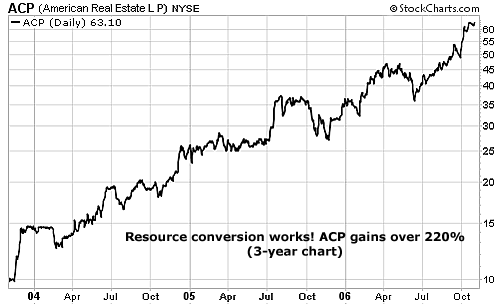| Home | About Us | Resources | Archive | Free Reports | Market Window |
The Lost Secret of Resource ConversionBy
Wednesday, November 1, 2006
Back in August 2003, it was impossible to predict the future of MFC Bancorp...
MFC was a company your mutual fund manager would avoid like the plague. Its earnings weren't predictable, and most folks were too lazy to dig through its annual reports and make sense of its enormous hodgepodge of assets.
MFC had just gotten control of Equidyne, a failed biotech company with loads of extra cash on its balance sheet. MFC also owned 47 acres of undeveloped land, in Washington, a royalty interest in the second-largest iron-ore mine in North America, the largest zinc-alloy producer in the UK, 75% of an African cobalt refinery, and many other valuable assets... all trading for a 35% discount to net asset value.
That enormous discount, like buying a dollar for 65 cents, is why I urged Extreme Valuereaders to buy MFC Bancorp three years ago.
Since then, MFC has spun off the cobalt refinery and its financial services businesses. It is now focused on engineering and supply for coal and cement plants around the world. It also has a new name and ticker symbol: KHD Humboldt Wedag (KHDH).
In addition to the value of the two spin-offs, MFC stock has risen about 179%, and it still has nearly half its market cap in cash. How was making so much money so easy with MFC Bancorp? Resource Conversion.
Resource conversion is simply the process of turning redundant assets like land, mineral rights, royalty payments, and cash into investment profits. It's one of the lost secrets of value investing. And as the returns in MFC Bancorp illustrate, you hardly have to know a thing about a business' future earnings to make a lot of money with this strategy.
Wall Street analysts are all focused on making earnings per share predictions. But it's so much easier just to find a company with assets whose value can be known with certainty.
It was easy to identify a pile of distressed but high-quality assets, trading at a 35% discount to book value, and for less than half our conservative estimate of its fair value. Time, patience, and resource conversion took care of the rest.
Let me show you a few more examples of how resource conversion works...
When I recommended buying shares in Fairmont Hotels & Resorts in early 2005, it had a pristine balance sheet, some of the finest hotels on earth, and 65,000 acres of land in Canada.
We could never have predicted what would happen... Within months, private buyers acquired it at a 40% premium to our original reference price. Fairmont's land didn't help it ring up steady earnings, but it produced a huge return in no time.
My personal favorite resource is cold, hard cash. In January 2005, we found a little Internet security company called SONICWall (SNWL). It had over 60% of its market cap in cash, and no debt.
We figured that, with all that cash, SONICWall could pay a special dividend, buy back shares, or perhaps make an acquisition. It bought back shares and made acquisitions, and the stock is up 65%. That's resource conversion: redundant assets became investor profits.
The result of all this has been very good for anyone who took our advice. The averageExtreme Value stock is up about 46% in an average holding period of about 578 days. That's an average annual rate of compounding of over 26%, pretax. That beats most mutual funds, most newsletters... most everybody in the market.
It's very hard to make more money than this without taking on much more risk. And if you play it this safe in the bond market, you'll be lucky to clear 10% a year.
I've found one of the greatest investment secrets of all time. It's called resource conversion, and it's making Extreme Value readers very rich.
Good investing,
Dan
Market NotesWHAT RESOURCE CONVERSION LOOKS LIKE DailyWealth loves Dan Ferris' idea of resource conversion so much, we'll give you one more example of how profitable this investing can be...
Just over two years ago, Dan told us to load up on shares of a small master limited partnership controlled by Carl Icahn, American Real Estate Partners (ACP). Dan cited the deep discount at which we could buy the firm's cash and real estate:
American Real Estate Partners has soared more than 220% since Dan's buy recommendation. Buying underfollowed, unloved assets works like a charm.
 |
Recent Articles
|

